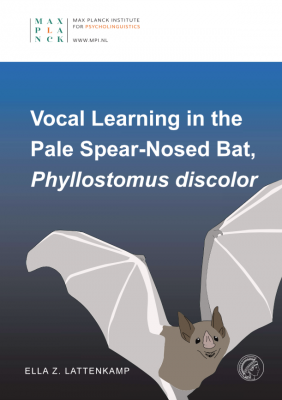Ella Lattenkamp will defend her thesis Thursday 23rd of April 2020

Due to the current situation this defense will be held remotely. As with regular defenses, it is a public event, and everybody is welcome to join via this live stream.
Although humans are unmatched in their capacity to produce speech and learn language, comparative approaches in animal models can shed light on the biological and evolutionary underpinnings of language-relevant traits. In her thesis, Ella Lattenkamp highlights the value of bats as a mammalian model system for the study of vocal learning and provides experimental evidence for the vocal learning capacity of the pale spear- nosed bat, Phyllostomus discolor. She first described the vocal repertoire of this bat species as a basis for the investigation of vocal learning and was able to show that the different vocalisations were used in specific behavioural contexts. She then went on to use controlled behavioural training paradigms for the demonstration of their vocal plasticity and capacity for vocal learning. For these behavioural experiments, Ella Lattenkamp trained adult bats in isolation to emit social vocalisations in order to elicit food rewards. With this approach she was able to demonstrate that pale spear-nosed bats have volitional control over their social call emission, which was the first demonstration of such a behavioural paradigm in a bat model. Furthermore, she also showed that these bats can modify distinct parameters of their calls in response to challenges imposed on them by the paradigm. Her research demonstrates the capacity for the pale spear-nosed bat to perform vocal learning and future work will build on this setup and paradigm to further our understand of the complexity of the vocal learning behaviour in these bats, which will ultimately bring us one step closer to understanding the human capacity for speech and language acquisition.
Share this page